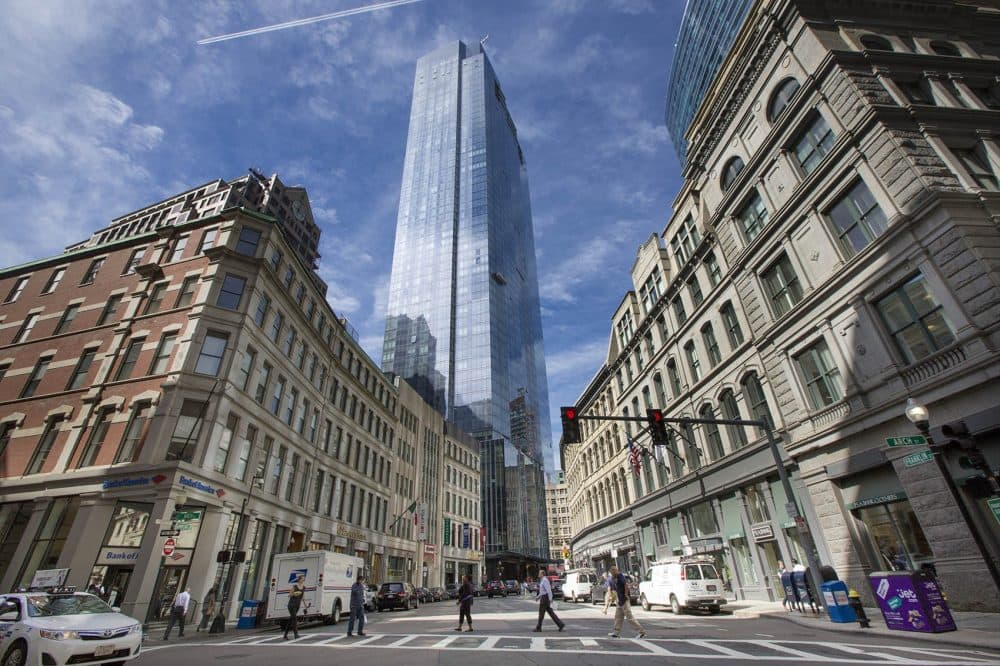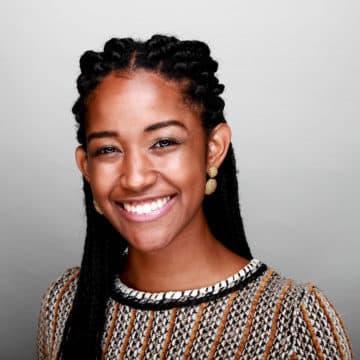Advertisement
Being Black In The Boston Business World
Resume
This Black History Month, we've been shining a light on various aspects of the Black experience in Boston.
We've remembered pioneering legends such as former state Rep. Doris Bunte and architect Donald Stull, and have taken stock of how those communities hit hardest by the coronavirus are tackling equity and hesitancy in the vaccine rollout.
Today, we speak with three Black professionals who are part of Boston's business community, and discuss their experiences working in this city, and working to diversify it racially, economically and otherwise.
We're joined by Teri Williams, president and COO of Boston-based OneUnited Bank, the country's largest Black-owned bank. Also with us is Kristen Ransom, co-owner of IncluDe Innovation and IncluDe Web Design, and Sheena Collier, founder of the membership networks Boston While Black and The Collier Connection.
Interview Highlights
Borchers: How and why did you get into the fields that you're in?
Williams: "I'm surprised I'm in the banking field. I worked at American Express, I was very interested in financial services, but was really hesitant about the conservative nature of banking. So I went to American Express, but ultimately ended up coming to Boston and buying what used to be the Boston Bank of Commerce, which is a Black-owned community bank, because I believe that there was a way for us to use community banks in our community to help our community build wealth. And I'm glad I did."
"I realized that there's so much good that you can do if you can get past being the first, or the only, in the room."
Kristen Ransom
Ransom: "I found, you know, there definitely is an old boys club, there is a feeling of otherness when you're involved. But I think my love for design and development and just building things from a really young age — I used to take things apart and put them back together like it was nobody's business — and once someone told me, you know what, you should be an engineer, I realized that there's so much good that you can do if you can get past being the first, or the only, in the room."
Borchers: Sheena, you're in the business, I think, of connecting people in a way that overcomes some of the barriers that we just heard Kristen and Teri describe. Why was that your calling?
Collier: "Yes, that's a good way to put it. It is my calling, actually. Initially I started The Collier Connection as a way to work with companies and organizations throughout Greater Boston to really show them how to build community and networks with people of color — whether it's their customers, their employees, suppliers of color. ... I really just wanted to create this safe, inclusive space for Black people, professionals, entrepreneurs, students to really learn together how to navigate the landscapes of Boston, particularly socially, politically in the economic landscape. I thought it was really important just because, you know, Boston can be and has this reputation of being unwelcoming are not as friendly to everyone. And I think particularly for people of color and, in my case, Black people really just creating a point of access to information, to resources to opportunities so that people really feel like they belong and want to live and work in the city."
Borchers: What has your experience been like coming to Boston and just living your own identity in this city?
Collier: "I'm from Albany, New York. So, you know, New York has a somewhat similar reputation, but I moved here from Atlanta, Georgia, and I was there for four years for college, so I definitely had gotten used to the Southern hospitality. And when I moved up here, I moved here 17 years ago to Harvard for graduate school. And, you know, all the perceptions I had of Boston from my quick visits growing up — going to Quincy Market to the many movies that are out about Boston — I felt like initially they were confirmed. ... Just being in the area took me a long time to really feel like it was a space where I belonged. ... It wasn't really until I started to do my own exploring both through my job and in other ways to really dig deeper into where the communities of color were here. And, you know, unbeknownst to me, Boston is actually very rich with communities of color and something I think that we should see much more as an asset, which I sometimes I think is seen as a deficit."
"Boston is actually very rich with communities of color and something I think that we should see much more as an asset, which I sometimes I think is seen as a deficit."
Sheena Collier
Borchers: Teri, I'm wondering if there are things that you feel that you have to think about as a Black woman, that your non-Black colleagues do not in your business world?
Williams: "Oh, yeah, there's no question and, you know, my experience is actually similar to Sheena. I came here for grad school at Harvard Business School and really had to work to connect to the Black community in a way that I don't think that my counterparts have to. And, you know, one of the things that I would say a lot of people don't know is that Boston is a majority minority city. I mean, people just don't have that impression of Boston. There are a lot of us here, a lot of Black folks here, and there are also a lot of organizations to connect to. You know, I always say to students, join the NAACP, join the Urban League ... the Black Economic Council of Massachusetts, all these organizations that can connect you to the Black community. And you really do have to do that if you're Black in Boston, because if you're downtown, you feel like there's no Black people, you know, whereas if you go to Roxbury, Dorchester, Mattapan, even, you know, she mentioned areas of Cambridge and all you see are Black people. So, you know, it's sort of that dichotomy, that racial wealth gap, segregation in terms of where we live, I mean, all those things play a part. ... So we definitely have to really spend more time focusing on connecting to the Black community in Boston."
Collier: "Something I've said to my white counterparts at times when talking about a lot of initiatives is I really think that we overcomplicate things. And I think that, you know, you can think about what you would want for yourself at work, or what you would want for yourself in your community and just do that. That's the same thing people of color want, it's the same thing Black people want. There may be some differences in delivery because of cultural differences, but we really want and need the same things to be successful in these spaces."
Borchers: Before the program, you had mentioned as a systemic problem was the state's ban on happy hour. If we had that here, in a non-pandemic world, this might be another opportunity for Black people and everyone, of course, to do some more networking. And it might actually mean there's a racial equity argument for happy hour.
Collier: "The reason I mentioned it, you know, I'm often talking with people about, one, is Boston fun, and is it somewhere that really attracts people? And I think sometimes the conversation stops there because people think it's about people want to dance more, they want to drink more, but it's really about creating some economic activity. And we know that particularly when you get to millennials, people are choosing where they live and then choosing where they work. And so if you don't have places that really draw people in and if you have a certain level of education and connections and other things at this point, you could probably find a good job in most places, most cities. And so it's really about where do I want to create a life? Where do I feel like I'll have a great social life? I'll be able to have a family if I want, etc. And so with the happy hour piece, with those types of laws on the books, I was making the point that Boston has a hard time competing with places that just have more of a vibrancy and places where people just feel like there's more of a space to enjoy themselves."
"Boston has a hard time competing with places that just have more of a vibrancy and places where people just feel like there's more of a space to enjoy themselves."
Sheena Collier
Borchers: One thing I've been wondering about during this work-from-home period for those of us who are fortunate enough to be able to work from home, is whether one of the silver linings is that perhaps folks are experiencing fewer of the microaggressions that they had to put up with around the office.
Williams: "Actually, I think it's been harder for our community, for one, as you mentioned, a lot of us don't have the ability to work from home. And for those that do, there isn't the same opportunities to get to know the team as you would have if you were in the office. So you really do have to work harder at it. And then there's this whole thing about Zoom and the microaggressions of Zoom. I'm just going to talk specifically for Black women, you know, sort of, how do you dress? How do you look? What's your background? There's a lot there that causes some stress that is particular to our community. So I don't know. I think that there's some benefits, of course, from working from home, but I think from a Black community's perspective there's also some downsides to it."
Ransom: "As a parent, I feel like it is very interesting being a woman, especially in the technical sphere, being there physically without your children, you're able to kind of focus exactly on what you're trying to say. And it seems like even though everyone is working, or at least most people in the technical sphere are working from home, there is a lot of judgment being passed when you have your kids in the background or where you're trying to multitask. It almost feels like you have to do twice the work again, just to again prove that you are just as capable, just as focused on what you're doing."
This segment aired on February 18, 2021.

